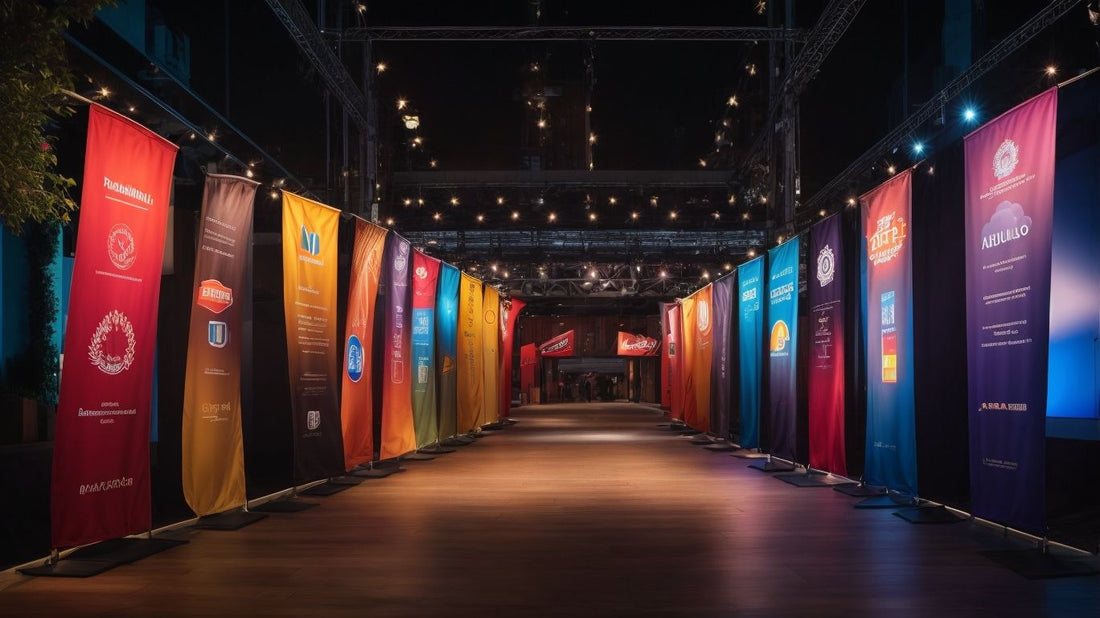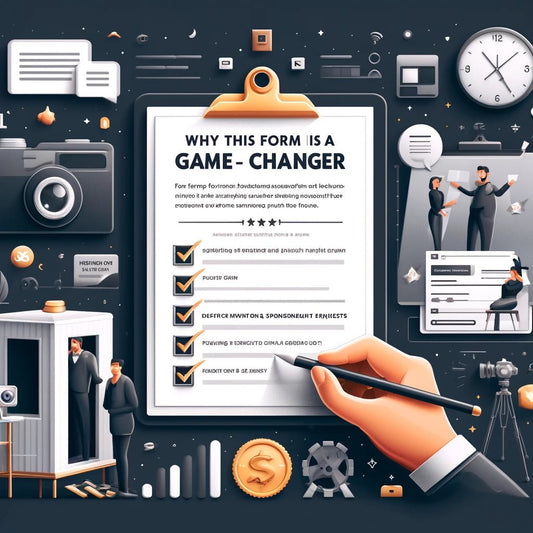
Maximizing Exposure: The Benefits of Corporate Event Sponsorship
Share
.jpg)
Corporate event sponsorship is a strategic marketing approach in which companies provide financial or in-kind support to events in exchange for various benefits and opportunities. It allows companies to align themselves with specific events and target audiences, thereby achieving their marketing objectives. The motives behind corporate event sponsorship vary but generally include brand exposure and awareness, targeted marketing, building goodwill and reputation, and networking for business opportunities.
There are different types of corporate event sponsorships, including title sponsorship, presenting sponsorship, supporting sponsorship, and in-kind sponsorship. Each type offers unique benefits and levels of involvement for the sponsoring company.
Finding sponsorship opportunities requires researching relevant events, contacting event organizers, and networking with industry peers to explore potential partnerships and collaborations.
The benefits of corporate event sponsorship are numerous. It provides increased brand visibility, enhances brand image and credibility, allows targeted audience reach, and provides an opportunity for product showcase and promotion.
However, corporate event sponsorship also presents challenges and considerations. Budget considerations, alignment with company values, and measuring return on investment are important factors to keep in mind when deciding on sponsorship opportunities.
To gain insights and inspiration, success stories of corporate event sponsorship, including case studies, can be studied. Examining impactful sponsorships like those of XYZ Company and strategic event sponsorships like that of ABC Company can provide valuable lessons and ideas for a successful sponsorship strategy.
What is Corporate Event Sponsorship?
Corporate event sponsorship, also known as corporate event sponsoring, essentially involves companies providing financial or in-kind support to various events. This strategic collaboration between the sponsoring company and the event organizer proves to be advantageous for both parties involved. On one hand, the sponsoring company benefits from increased exposure, improved brand recognition, and a positive association with the event. On the other hand, the event organizer receives crucial funding or resources necessary for the success of the event. Corporate event sponsorship can encompass a wide range of forms such as sponsoring conferences, trade shows, sports events, or cultural festivals. This diverse sponsorship approach enables companies to effectively connect with their target audience and effectively promote their products or services. Nonetheless, it is vital for companies to carefully consider their values and target audience in relation to the event at hand, as this ensures that their investment in corporate event sponsorship achieves maximum impact.
Why Do Companies Sponsor Events?
Companies sponsor events for a multitude of reasons, each contributing to their overall business objectives. From brand exposure and targeted marketing to building goodwill and creating networking opportunities, event sponsorship has become a strategic tool for organizations. Through this section, we'll uncover the diverse benefits that companies reap from sponsoring events, shedding light on the power of brand awareness, targeted marketing efforts, reputation building, and the potential for valuable connections and business opportunities. Prepare to dive into the dynamic world of corporate event sponsorship!1. Brand Exposure and Awareness
Corporate event sponsorship is a strategic marketing approach that enables companies to enhance their brand exposure and awareness. By sponsoring events, companies can effectively reach a larger audience and amplify their visibility among potential customers. This form of sponsorship presents an unparalleled opportunity for companies to showcase their brand, products, or services to a precisely targeted audience. Moreover, it greatly contributes to building a strong brand image and credibility by aligning the company with relevant events and activities. Before pursuing such sponsorships, companies should carefully consider the budget implications and ensure that the event values align with their own. Additionally, measuring the return on investment becomes crucial to accurately assess the impact of the sponsorship.
2. Targeted Marketing
Targeted marketing is one of the main reasons why companies choose to sponsor events. By selecting events that align with their target audience and brand positioning, companies can effectively promote their products or services to a specific group of people. Here are some benefits of targeted marketing through event sponsorship:
3. Building Goodwill and Reputation
Building goodwill and reputation is a key benefit of corporate event sponsorship. By associating with events aligned with their values and goals, companies can enhance their image and gain positive recognition.
- Positive Brand Association: Sponsoring events helps companies build a positive perception among attendees and the general public.
- Community Engagement: Supporting local and community-oriented events helps companies establish goodwill and strengthen relationships with stakeholders.
- Establishing Expertise: Sponsoring industry-specific events showcases a company's expertise and positions them as a thought leader in their field.
- Increased Credibility: Being associated with reputable events enhances a company's credibility and trustworthiness.
- Media Coverage: Sponsored events often receive media coverage, providing companies with additional exposure and positive publicity.
4. Networking and Business Opportunities
Networking and business opportunities are some of the primary advantages that companies can enjoy by sponsoring corporate events.
- Expand professional network: Participating in events enables companies to connect with industry peers, potential business partners, and influential individuals. Networking opportunities arise, leading to collaborations, partnerships, and potential business prospects.
- Create brand visibility: By sponsoring events, companies have the opportunity to showcase their brand to a broad audience, including industry professionals, media representatives, and potential clients. This increased brand visibility can result in business growth and recognition.
- Develop business leads: Engaging in events provides a platform for companies to generate leads and acquire new customers. Through face-to-face interactions and relationship-building activities, sponsors can cultivate business opportunities.
- Enhance reputation: By associating with well-regarded events and initiatives, companies can improve their reputation and build trust among stakeholders. This can result in an enhanced brand image and increased credibility.
Types of Corporate Event Sponsorship
Discover the exciting world of corporate event sponsorship and the various types that exist. From title sponsorship to presenting sponsorship, supporting sponsorship to in-kind sponsorship, each sub-section brings unique opportunities and benefits to both the sponsoring company and the event itself. Get ready to delve into the different ways businesses can get involved and make a meaningful impact in the realm of corporate event sponsorship.1. Title Sponsorship
Benefits associated with title sponsorship include: To discover potential opportunities for title sponsorship, it is advisable to: - Conduct thorough research to identify relevant events within your industry. - Reach out to event organizers, expressing interest in sponsorship and exploring potential partnerships. - Network with industry peers who might possess useful insights or connections. If you are aiming to increase visibility, connect with your target audience, and establish a strong brand presence within your industry, consider title sponsorship as an effective strategy. Presenting Sponsorship is a type of corporate event sponsorship where a company hosts and leads the event. This form of sponsorship offers numerous benefits for companies seeking to enhance their brand image and gain visibility among their target audience. If your company is interested in presenting sponsorship, you can follow these steps: Presenting sponsorship can provide companies with heightened brand recognition, increased credibility, and access to a targeted audience, making it a valuable opportunity for corporate event involvement. Supporting sponsorship is a type of corporate event sponsorship that involves providing financial or in-kind support to an event without being the main sponsor. Supporting sponsorship, also known as sponsored support, offers companies the opportunity to align themselves with a specific event, industry, or cause and gain visibility among the target audience. Some benefits of supporting sponsorship include:
To find supporting sponsorship opportunities, companies can research relevant events, contact event organizers, or network with industry peers. It is important to consider budget limitations and ensure alignment with company values. By strategically choosing and supporting events, companies can boost their brand visibility and reputation in the market. In-kind sponsorship is a type of corporate event sponsorship where companies provide goods or services instead of direct financial support. This type of sponsorship can be beneficial for both parties involved. Here are the steps to consider for in-kind sponsorship: In-kind sponsorship can be a cost-effective way for companies to support events and gain exposure. It allows you to showcase your products or services to a targeted audience while building goodwill and enhancing your brand image. Consider offering your expertise or unique products to differentiate your company and make a lasting impression. When conducting research for corporate event sponsorship, it is essential to follow a few key steps. First, you should identify your target audience by determining the demographics and interests of your ideal customers. This will help you find events that align with your brand's target market. Next, you should conduct online research using search engines, industry publications, and event directories. These resources will aid you in finding upcoming events that are relevant to your industry or target audience. Additionally, networking with industry peers is crucial. Attending industry conferences, trade shows, and networking events will allow you to connect with professionals who may have insights on relevant events. Once you have identified potential events, it is important to reach out to event organizers directly. Contacting them will enable you to inquire about sponsorship opportunities and obtain more information about the event's audience and marketing reach. Lastly, evaluating the potential return on investment (ROI) for each event is crucial. Factors such as attendee demographics, brand exposure, and cost of sponsorship should be analyzed to determine which events are most beneficial for your company. Always remember to align the objectives of your company with the events you choose. This will ensure that you find the perfect event for your sponsorship. Good luck in your search for researching relevant events! To effectively contact event organizers for sponsorship opportunities, it is important to follow these steps: 1. Researching Relevant Events: Start by identifying events that align with your brand values and target audience. 2. Prepare a Professional Proposal: Take the time to craft a compelling proposal that clearly outlines the benefits of sponsoring the event for both parties. 3. Contact Event Organizers: Reach out to event organizers through email, phone, or social media to express your interest in sponsorship. 4. Build Relationships: Attend industry events and network with event organizers to establish connections and create new opportunities for collaboration. 5. Negotiate Terms: Engage in discussions with the organizers to define a comprehensive sponsorship package that includes branding opportunities, logos, and promotional activities. 6. Review Contract: Before finalizing any agreements, thoroughly review the contract to ensure that all terms and expectations are clearly outlined in a formal agreement. 7. Measure Return on Investment: Regularly evaluate the success of the sponsorship to assess its impact and make informed decisions for future opportunities. By incorporating these steps, you will be able to effectively contact event organizers and maximize your chances of securing sponsorship opportunities. Networking with industry peers is an essential aspect of corporate event sponsorship. It provides opportunities for collaboration, knowledge sharing, and expanding professional contacts. Here are some ways to network effectively: Networking with industry peers is crucial as it can lead to fruitful partnerships, collaborations, and business opportunities, enhancing your company's reputation and industry presence. One example of successful networking in corporate event sponsorship is when Company X sponsored a technology conference. Through networking with industry peers attending the event, they forged partnerships with leading companies, resulting in new business ventures and increased visibility in the tech sector. Increased brand visibility is a significant benefit of corporate event sponsorship. It allows companies to reach a wider audience and increase brand exposure. Here are some ways in which sponsorship can enhance brand visibility: By capitalizing on these visibility opportunities, companies can strengthen their brand presence and increase awareness among their target audience.
- Maximized brand exposure and awareness due to the prominent placement and association with the event.
- The opportunity to target a specific audience and market directly to them, increasing the success of marketing efforts.
- Enhanced reputation and goodwill as the company is acknowledged as a critical supporter of the event.
- The chance to create valuable networking and business opportunities through connections made at the event.
2. Presenting Sponsorship
3. Supporting Sponsorship
4. In-Kind Sponsorship
How to Find Sponsorship Opportunities?
Looking to find sponsorship opportunities for your next corporate event? This section will guide you through the path to success. We'll start by uncovering techniques to research relevant events, followed by strategies on how to effectively connect with event organizers. We'll delve into the power of networking, exploring ways to build valuable connections with industry peers. Get ready to unlock a world of sponsorship possibilities and make your corporate event a resounding success!
1. Researching Relevant Events
2. Contacting Event Organizers
3. Networking with Industry Peers
Benefits of Corporate Event Sponsorship
Discover the incredible advantages that come with corporate event sponsorship. From amplified brand visibility to a boost in brand image and credibility, targeted audience reach, and even the opportunity for product showcase, these benefits are a game-changer for businesses looking to make an impact. This section unravels the true power behind corporate event sponsorship, shedding light on how it can skyrocket your brand's success and propel your company to new heights. Get ready to witness the tangible rewards that await those who take the plunge.
1. Increased Brand Visibility
2. Enhanced Brand Image and Credibility
3. Targeted Audience Reach
To achieve targeted audience reach, corporate event sponsorship offers a range of benefits and opportunities. Here are some ways sponsors can effectively reach their desired audience:
- 1. Event selection: Choose events that align with your target demographic and industry, ensuring that your message reaches the right audience.
- 2. Customized branding: Utilize customized branding opportunities, such as signage, banners, and promotional materials, to increase brand visibility among attendees.
- 3. Targeted audience reach: Leverage event-specific marketing channels like social media promotions, event websites, and email campaigns to reach a wider audience.
- 4. Networking and engagement: Engage with attendees through networking events, workshops, and demonstrations, allowing direct interaction and relationship-building.
By strategically selecting events, utilizing customized branding, leveraging event-specific marketing channels to achieve targeted audience reach, and fostering engagement, sponsors can effectively reach their targeted audience and maximize their sponsorship ROI.
4. Opportunity for Product Showcase
Corporate event sponsorship provides companies with an opportunity for product showcase, allowing them to showcase their products to a targeted audience and create brand awareness.
- Product Display: Companies can set up booths or displays at events to showcase their products and engage with attendees.
- Sampling: Events provide a platform for companies to offer product samples, allowing potential customers to experience the product firsthand.
- Demonstrations: Companies can arrange live demonstrations or presentations to showcase the unique features and benefits of their products.
- Product Launch: Events can serve as a platform for companies to launch new products, generating excitement and publicity.
Fact: According to a study, 70% of event attendees become regular customers after experiencing a product at an event.
Challenges and Considerations of Corporate Event Sponsorship
Corporate event sponsorship comes with its fair share of challenges and considerations. From budget considerations to aligning with company values and measuring return on investment, each aspect demands careful attention. Dive into the world of corporate event sponsorship as we navigate through these sub-sections, exploring the financial implications, the importance of company alignment, and the ways to effectively measure the impact of sponsorship investments. It's time to unravel the complexities and unlock the potential of successful corporate event sponsorship.1. Budget Considerations
When considering corporate event sponsorship, budget considerations play a crucial role in decision-making. Budget considerations are key factors to keep in mind when determining the amount of money your company is willing to allocate towards event sponsorship. It is important to prioritize events that align with your company's goals and target audience. Additionally, negotiation plays a significant role in sponsorship packages, ensuring that they provide value for money by offering additional marketing opportunities or exclusive access. Furthermore, it is essential to establish key performance indicators to measure the return on investment and determine if the sponsorship is yielding the desired results.
Here's a pro-tip: Consider partnering with local organizations or industry associations, as they often offer cost-effective sponsorship opportunities while providing targeted exposure to your desired audience. By incorporating budget considerations into your decision-making process, you can ensure that your sponsorship investments are effective and yield positive outcomes.
2. Alignment with Company Values
When considering corporate event sponsorship, it is crucial to align with company values for a successful partnership. This ensures that the event’s mission, goals, and audience resonate with the company's core beliefs. By aligning with company values, sponsorship opportunities can be chosen that correspond to the brand's identity and message. This alignment creates a genuine connection with the target audience and enhances the company's reputation and credibility. It also plays a vital role in building a positive brand image and fostering customer loyalty. Ultimately, by aligning with company values in event sponsorship, not only does it benefit the brand, but it also contributes to the overall success and impact of the event.
3. Measuring Return on Investment
When it comes to corporate event sponsorship, measuring the return on investment (ROI) is crucial for companies. One way to measure ROI is by setting clear objectives and defining specific goals and outcomes that can be measured quantitatively. Another way is to track attendance and engagement, monitoring the number of attendees, their level of engagement, and feedback collected during and after the event. Additionally, calculating brand exposure is important, which can be done by measuring the visibility and reach of your brand through metrics such as social media impressions, media coverage, and website traffic. Evaluating lead generation and conversions is also vital, assessing the number and quality of leads generated from the event and tracking the conversion rate into sales. Lastly, it is essential to analyze cost-effectiveness by comparing the expenses incurred with the overall benefits and returns achieved from the event.
One example of successful ROI measurement in event sponsorship is the case of XYZ Company. By tracking attendee engagement, online interactions, and subsequent increase in sales, they were able to prove a significant return on their investment.
Success Stories of Corporate Event Sponsorship
Discover the remarkable success stories of corporate event sponsorship that demonstrate the immense impact it can have on businesses. Dive into gripping case studies, such as XYZ Company's powerful sponsorship that left a lasting mark, and ABC Company's strategic event sponsorship that propelled their brand to new heights. Prepare to be inspired by real-world examples and gain insights into how corporate event sponsorship can bring outstanding results.1. Case Study 1: XYZ Company's Impactful Sponsorship
XYZ Company's impactful sponsorship serves as a prime example of the benefits of corporate event sponsorship. By partnering with a high-profile industry conference, XYZ gained significant brand visibility and recognition among key stakeholders. The sponsorship also allowed XYZ to showcase their innovative products and services, which generated new business opportunities and increased sales. XYZ's involvement in the event demonstrated their commitment to industry advancement and positioned them as a thought leader, enhancing their brand image and credibility. This case study, titled "Case Study 1: XYZ Company's Impactful Sponsorship," highlights the tremendous impact that strategic corporate event sponsorship can have on a company's success and growth.
Fun fact: Studies show that 95% of event attendees have a more positive opinion about a brand after experiencing it at an event.
2. Case Study 2: ABC Company's Strategic Event Sponsorship
2. Case Study 2: ABC Company's Strategic Event Sponsorship served as a catalyst for brand growth and industry recognition. By partnering with a highly-regarded industry conference, ABC Company positioned itself as a leader in the field. Through a series of engaging sessions, interactive workshops, and product demonstrations, ABC showcased its expertise and fostered meaningful connections with key stakeholders. This sponsorship not only bolstered ABC's brand image and credibility but also resulted in increased sales and expanded market reach. By leveraging the platform of this event, ABC Company achieved remarkable success and solidified its position as an industry frontrunner.






